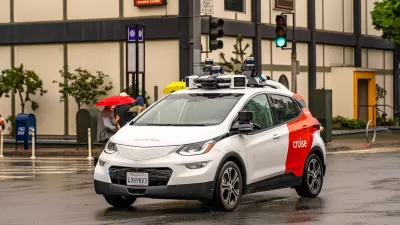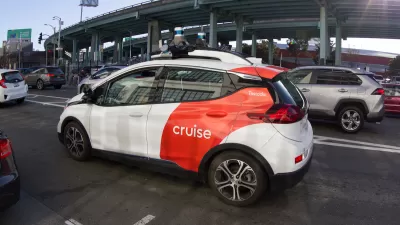The autonomous car company’s precipitous downfall offers lessons for other carmakers.

In an article in Fast Company, Jessica Bursztynsky outlines the brief history of Cruise, the autonomous car maker that seemed poised to be at the forefront of the self-driving revolution. “But building successful AVs proved to be pricier and more time consuming than initially expected, so many of Cruise’s peers ended their self-driving goals in the coming years. Cruise, and Google’s Waymo, were among the last and best players standing.”
After allowing the company to begin offering autonomous taxi rides in San Francisco earlier this year over protests from local officials, California regulators pulled Cruise’s operating license after multiple crashes and incidents involving its vehicles, including a San Francisco collision in which a Cruise vehicle dragged a woman before stopping. Then, facing more scrutiny, the company abruptly ended its operations across the country.
Now, Cruise has laid off almost a quarter of its workforce and “could also face $1.5 million in fines and additional sanctions” from the California Transportation Commission for “misleading the commission through omission regarding the extent and seriousness of the accident” and making misleading public comments.
FULL STORY: How Cruise went from buzzy self-driving startup to ‘public safety risk’

Alabama: Trump Terminates Settlements for Black Communities Harmed By Raw Sewage
Trump deemed the landmark civil rights agreement “illegal DEI and environmental justice policy.”

Planetizen Federal Action Tracker
A weekly monitor of how Trump’s orders and actions are impacting planners and planning in America.

The 120 Year Old Tiny Home Villages That Sheltered San Francisco’s Earthquake Refugees
More than a century ago, San Francisco mobilized to house thousands of residents displaced by the 1906 earthquake. Could their strategy offer a model for the present?

In Both Crashes and Crime, Public Transportation is Far Safer than Driving
Contrary to popular assumptions, public transportation has far lower crash and crime rates than automobile travel. For safer communities, improve and encourage transit travel.

Report: Zoning Reforms Should Complement Nashville’s Ambitious Transit Plan
Without reform, restrictive zoning codes will limit the impact of the city’s planned transit expansion and could exclude some of the residents who depend on transit the most.

Judge Orders Release of Frozen IRA, IIJA Funding
The decision is a victory for environmental groups who charged that freezing funds for critical infrastructure and disaster response programs caused “real and irreparable harm” to communities.
Urban Design for Planners 1: Software Tools
This six-course series explores essential urban design concepts using open source software and equips planners with the tools they need to participate fully in the urban design process.
Planning for Universal Design
Learn the tools for implementing Universal Design in planning regulations.
Clanton & Associates, Inc.
Jessamine County Fiscal Court
Institute for Housing and Urban Development Studies (IHS)
City of Grandview
Harvard GSD Executive Education
Toledo-Lucas County Plan Commissions
Salt Lake City
NYU Wagner Graduate School of Public Service





























